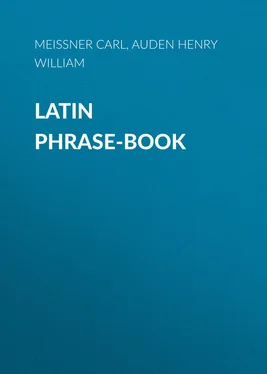Carl Meissner - Latin Phrase-Book
Здесь есть возможность читать онлайн «Carl Meissner - Latin Phrase-Book» — ознакомительный отрывок электронной книги совершенно бесплатно, а после прочтения отрывка купить полную версию. В некоторых случаях можно слушать аудио, скачать через торрент в формате fb2 и присутствует краткое содержание. Жанр: foreign_antique, foreign_prose, на латинском языке. Описание произведения, (предисловие) а так же отзывы посетителей доступны на портале библиотеки ЛибКат.
- Название:Latin Phrase-Book
- Автор:
- Жанр:
- Год:неизвестен
- ISBN:нет данных
- Рейтинг книги:5 / 5. Голосов: 1
-
Избранное:Добавить в избранное
- Отзывы:
-
Ваша оценка:
- 100
- 1
- 2
- 3
- 4
- 5
Latin Phrase-Book: краткое содержание, описание и аннотация
Предлагаем к чтению аннотацию, описание, краткое содержание или предисловие (зависит от того, что написал сам автор книги «Latin Phrase-Book»). Если вы не нашли необходимую информацию о книге — напишите в комментариях, мы постараемся отыскать её.
Latin Phrase-Book — читать онлайн ознакомительный отрывок
Ниже представлен текст книги, разбитый по страницам. Система сохранения места последней прочитанной страницы, позволяет с удобством читать онлайн бесплатно книгу «Latin Phrase-Book», без необходимости каждый раз заново искать на чём Вы остановились. Поставьте закладку, и сможете в любой момент перейти на страницу, на которой закончили чтение.
Интервал:
Закладка:
alicuius animum ab aliqua re abducere – to draw away some one's attention from a thing.
cogitationem, animum in aliquid intendere (Acad. 4. 46) – to direct one's attention…
omnes cogitationes ad aliquid conferre – to give all one's attention to a thing.
mentem in aliqua re defigere – to fix all one's thoughts on an object.
in cogitatione defixum esse – to be deep in thought.
cogitationes in res humiles abicere (De Amic. 9. 32) (Opp. alte spectare, ad altiora tendere, altum, magnificum, divinum suspicere ) – to study the commonplace.
3. Conceptions – Ideals – Perfection
notiones animo (menti) insitae, innatae – innate ideas.
intellegentiae adumbratae 90 90 adumbrare is a technical term of painting = to make a sketch, outline of an object; then metaphorically, to merely hint at a thing. Its opposite is exprimere , technical term of sculpture, =figuratively, to represent exactly, clearly. It never has the simple meaning "to express."
or incohatae (De Leg. 1. 22. 59) – vague, undeveloped ideas.
notionem or rationem alicuius rei in animo informare or animo concipere – to form a conception, notion of a thing.
absolutus et perfectus – absolutely perfect.
omnibus numeris absolutus (N. D. 2. 13) – perfect in every detail.
ad summum perducere – to bring to the highest perfection.
perficere et absolvere – to bring to the highest perfection.
ad perfectionem, (ad summum) pervenire – to attain perfection.
absolutio et perfectio (not summa perfectio ) – ideal perfection.
cogitatione, non re – ideally, not really.
undique expleta et perfecta forma – an ideal.
species optima or eximia, specimen , also simply species, forma – an ideal.
comprehensam quandam animo speciem (alicuius rei) habere – to have formed an ideal notion of a thing.
singularem quandam perfectionis imaginem animo concipere – to conceive an ideal.
imaginem perfecti oratoris adumbrare – to sketch the ideal of an orator.
civitas optima, perfecta Platonis – Plato's ideal republic.
illa civitas Platonis commenticia – Plato's ideal republic.
illa civitas, quam Plato finxit – Plato's ideal republic.
4. Opinion – Prejudice – Conjecture
in sententia manere, permanere, perseverare, perstare – to abide by, persist in one's opinion.
illud, hoc teneo – I abide by this opinion.
a sententia sua discedere – to give up one's opinion.
de sententia sua decedere – to give up one's opinion.
(de) sententia desistere – to give up one's opinion.
de sententia deici, depelli, deterreri – to be forced to change one's mind.
de sententia aliquem deducere, movere – to make a man change his opinion.
aliquem ad suam sententiam perducere or in suam sententiam adducere – to win a man over to one's own way of thinking.
ad alicuius sententiam accedere, sententiam alicuius sequi – to adopt some one's opinion.
idem sentire (opp. dissentire ab aliquo ) – to hold the same views.
sententiam suam aperire 91 91 se aperire = to betray oneself; cf. se indicare (Liv. 2. 12).
– to freely express one's opinions.
sententiam fronte celare, tegere – not to betray one's feelings by one's looks.
dic quid sentias 92 92 Not sententiam dicere , which is used of senators giving their vote; cf. suffragium ferre .
– give me your opinion.
in hac sum sententia, ut…putem – I think that…
plura in eam sententiam disputare – to discuss a subject more fully on the same lines.
ut mea fert opinio – according to my opinion.
ut mihi quidem videtur – according to my opinion.
mea (quidem) sententia – according to my opinion.
quot homines, tot sententiae – many men, many minds.
opiniones falsas animo imbibere – to be imbibing false opinions.
opinionibus falsis imbui – to be imbibing false opinions.
opinionis error – erroneous opinion.
opinio praeiudicata , also simply opinio (not praeiudicium = a preliminary decision) – prejudice.
opinio confirmata, inveterata – a rooted opinion.
opinionum pravitate infici – to be filled with absurd prejudices.
opinionum commenta (N. D. 2. 2. 5) – chimeras.
monstra or portenta – marvellous ideas; prodigies.
coniectura assequi, consequi, aliquid coniectura colligere – to conjecture.
quantum ego coniectura assequor, auguror – as far as I can guess.
coniecturam alicuius rei facere or capere ex aliqua re – to infer by comparison, judge one thing by another.
de se (ex se de aliis) coniecturam facere – to judge others by oneself.
aliquid in coniectura positum est – it is a matter of conjecture, supposition.
aliquid coniectura nititur, continetur (Div. 1. 14. 24) – it is a matter of conjecture, supposition.
probabilia coniectura sequi – to try to conjecture probabilities.
aliquid mihi nec opinanti, insperanti accidit – a thing has happened contrary to my expectation.
5. Truth – Error
verum dicere, profiteri – to speak the truth, admit the truth.
omnia ad veritatem 93 93 verum = the truth, concrete; veritas = truth in the abstract.
dicere – to be truthful in all one's statements.
veritatis amans, diligens, studiosus – truthful; veracious.
a vero aversum esse (Catil. 3. 1. 29) – to be averse to truth.
a veritate deflectere, desciscere – to swerve from the truth.
veri videndi, investigandi cupiditas – love of truth.
veri inquisitio atque investigatio – zealous pursuit of truth.
a vero abduci – to be led away from the truth.
proxime ad verum accedere – to be very near the truth.
a vero non abhorrere – to be probable.
veri simile esse – to be probable.
haec speciosiora quam veriora sunt – this is more plausible than true.
vera et falsa (a falsis) diiudicare – to distinguish true and false.
vera cum falsis confundere – to confuse true with false.
veritas – veracity.
re (vera), reapse (opp. specie ) – in truth; really.
in errore versari – to be mistaken.
magno errore teneri – to be in gross error, seriously misled.
in magno errore versari – to be in gross error, seriously misled.
vehementer errare – to be in gross error, seriously misled.
erroribus implicari (Tusc. 4. 27. 58) – to fall into error.
per errorem labi , or simply labi – to take a false step.
aliquem in errorem inducere, rapere – to lead a person into error.
errorem animo imbibere – to get a mistaken notion into the mind.
errorem cum lacte nutricis sugere (Tusc. 3. 1. 2) – to imbibe error from one's mother's breasts.
error longe lateque diffusus – a wide-spread error.
Читать дальшеИнтервал:
Закладка:
Похожие книги на «Latin Phrase-Book»
Представляем Вашему вниманию похожие книги на «Latin Phrase-Book» списком для выбора. Мы отобрали схожую по названию и смыслу литературу в надежде предоставить читателям больше вариантов отыскать новые, интересные, ещё непрочитанные произведения.
Обсуждение, отзывы о книге «Latin Phrase-Book» и просто собственные мнения читателей. Оставьте ваши комментарии, напишите, что Вы думаете о произведении, его смысле или главных героях. Укажите что конкретно понравилось, а что нет, и почему Вы так считаете.

![Рис Хьюз - Madonna Park[e-book - рассказы]](/books/94285/ris-hyuz-madonna-park-e-book-rasskazy-thumb.webp)










